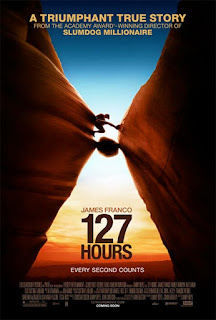In 2003, mountaineer Aron Ralston was canoyoneering in Utah when a boulder pinned his arm against a canyon wall. After 127 hours of battling dehydration, starvation, and the elements, Ralston resorts to amputating his arm with a small knife from a cheap multitool. Based on his autobiography Between a Rock and a Hard Place, Danny Boyle (Trainspotting, Slumdog Millionaire) has adapted the dramatic story with James Franco portraying Ralston into the aptly titled film 127 Hours.
Boyle initially intended for the beginning portion to be entirely dialogue-free, however, presumably due to inaccessibility, this was altered to include an encounter with a couple of young girls walking through the canyons. Not wasting any time, 127 Hours quickly races towards the ultimate conflict of the film with Franco pinned in the canyon. While Aron Ralston is trapped for 127 hours, the film relies on flashbacks and hallucinatory premonitions to convey the emotional turmoil of a desperate man facing a slow death. Despite these intermittent breaks, the film really rests on the shoulders of its star, James Franco.

One of the most remarkable feats which Boyle and Franco manage to achieve with 127 Hours is not only filming the unfilmable, but making it widely accessible. Films like My Dinner with Andre, Buried, and, most recently, The Sunset Limited similarly rely on one or two characters to maintain the audience's engagement, however, they tend to do so at the cost of mainstream appeal. Unfortunately for 127 Hours, its greatest feat is also one of the few things holding it back.
James Franco delivers a performance which constantly teeters on the edge of phenomenal. The problem is not a fault of Franco, but of Boyle's choice of narrative style which is rife with unrelenting flashbacks/forwards that break up the momentum of emotional energy his star musters up. While this might make an otherwise challenging plot more palatable to the preferences of the masses, it detracts from the power which Franco is capable of channeling. Furthermore, by allowing the audience to take reprieve from the claustrophobic and cramped conditions of the canyon-tomb, Boyle has, essentially, dampened the stakes with which the protagonist is up against.
Additionally, I felt that the film was far glitzier than was necessary. Making heavy use of montages and three-way splitscreens reminiscent of DePalma, Boyle added a lot of fast-paced imagery which seemed diametrically opposed to the heart of a long and grueling exhibition of human endurance. Clocking in at just over 94 minutes, it felt as though Danny Boyle wanted the film to feel even shorter. Perhaps it's simply a matter of personal opinion whether this counter-intuitive pacing feels jarring, but I would have much rather had a film that was comfortable enough to allow the audience to share in some of the misery that the protagonist was forced to endure.
My final complaint with 127 Hours is a perfect example of how small things can have a huge impact on the enjoyment of a film. Product placement. The basic idea of product placement does not inherently bother me. In fact, I usually feel as though the inclusion of real world brands and products lends some level of superficial authenticity to a fictional world. Were it that 127 Hours merely included Mountain Dew, Gatorade, Canon, Sony, etc. as passing products which inhabit the world as portrayed onscreen, I would not have any gripe whatsoever. The key problem with product placement in general and 127 Hours specifically is when shots are intentionally framed around the product in question, rather than the product existing naturally within the shot. A prime example is found in the opening scene in which Franco opens his fridge (camera mounted in back of the fridge facing out) and front and center of the otherwise nearly barren appliance is an in-focus, pristine, and easily readable can of Mountain Dew. It's with this overtly intentional positioning that product placement ceases and it becomes a Mountain Dew ad.
Thusfar, it would seem as though I found 127 Hours to be quite a challenge to sit through. In actuality, I found it to be a very well made film. Despite its several massive flaws, the movie still manages to rise above all of the disservice which it does to itself and convey a very compelling story full of inspirational spirit and superhuman perseverance. When the film is not derailing itself with a hallucinatory excursion, the acting is top-notch and the tension mounts quite greatly. Furthermore, A.R. Rahman's score is absolutely perfect at subtly cuing the shifting emotions of the film. Another thing which 127 Hours does incredibly well is managing to keep the suspense up and audience interested in a storyline which has been spoiled by the fact that it's nonfiction. The climax of the film is something which is not a surprise to anyone watching, yet the journey to that penultimate scene is no less harrowing.
127 Hours is a well above average film which is entertaining, inspirational, and dramatic. Were it not directed by Danny Boyle, one of the most talented directors today, I suppose I could have granted it more leniency. In all honesty, I feel that most people who will see this movie will enjoy it more than they expect precisely for the reason I did not enjoy it quite as much I expected: it is not nearly as arthouse or avant-garde as the plot synopsis would imply.

Very happy to see a movie review from you!
ReplyDeleteWhile I suppose most people know the plot, I'll suggest for the future that you put spoilers below the page break, maybe even with a "Spoiler Alert" warning above the break. Just my two cents.